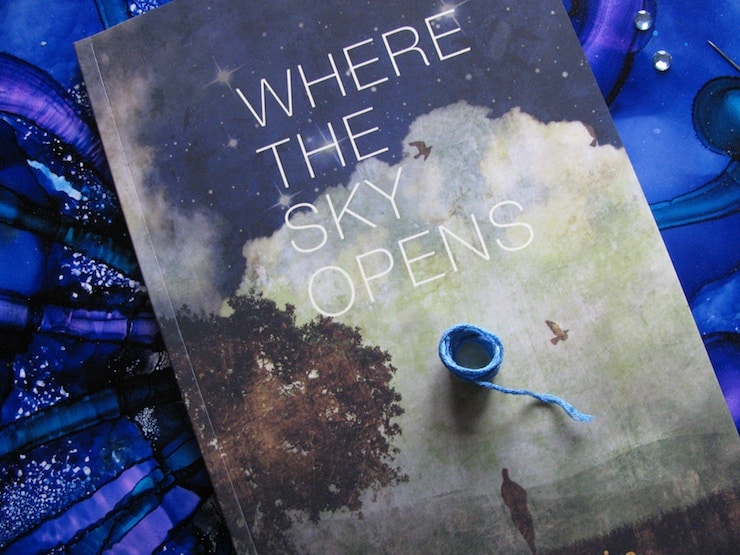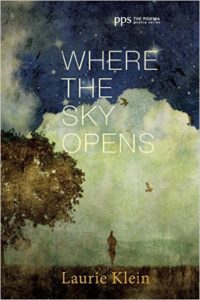
But many other life events can be called major and significant—a physical move to a new home, new part of the country, or even a new country; a serious illness; spouses separating; a family crisis that leads to division and walls; perhaps even a spouse changing his or her philosophy of life—the one you’ve known for years, the one that’s helped to anchor you as well as your spouse. Suddenly, life is unhinged. The ground has shifted; the landscape has become unfamiliar.
That is the sense of Laurie Klein’s newly published collection of poems, Where the Sky Opens: A Partial Cosmography. What was known as normal and established has disappeared, sometimes within ourselves, and something new has to be recognized and charted.
Klein turns to nature, inviting us (and herself) to consider ways to reorient ourselves when we encounter the unfamiliar. Beauty can be found in this new land, to be sure, beauty that was likely always there from the beginning. But there are also dangers to be navigated.
Warning

cottonwood tree, with its quicksilver sheen,
big-hearted leaves and their wind-sourced
repertoire: page rustle to patter of rain,
applause to downpour.
A tree so genial
to the hunting owl
will drop
without warning
a lushly upholstered limb,
smash all in its path
in that relentless way meddlers
lob hints and insinuations, leave the crater
to slowly scar over, but not before
something with talons digs in, claiming
the tree no longer a fort, a mother, a lullaby.

Laurie Klein
The poems have a profound sense of calmness and tranquility about them; one can imagine sitting quietly with Klein in her back yard watching birds and small animals move through the nearby trees. The noises of the everyday have moved somewhere else; we know that this is where we should be, where we need to be.
Klein (in her own words) has “switched hats more often than hoboes in a vaudeville skit.” She’s been a songwriter, artist, actress, mime, clown, storyteller, audiobook narrator, teacher, director, writer, and editor. She wrote the classic praise chorus “I Love You, Lord” and received the Thomas Merton Prize for Poetry of the Sacred. Through all of these careers, I suspect she has always been a poet; the poems in Where the Sky Opens speak to a lifetime. She blogs at Laurie Klein Scribe and lives in the Pacific Northwest.
Where the Sky Opens is an extraordinarily fine collection, offering quiet and calming words to help navigate major life changes.
Photo by L.L. Barkat, Creative Commons, via Flickr. Post by Glynn Young, author of the novels Dancing Priest and A Light Shining, and Poetry at Work.
__________________________

“I require all our incoming poetry students—in the MFA I direct—to buy and read this book.”
—Jeanetta Calhoun Mish
- Longfellow’s “Paul Revere’s Ride”: Creating a National Legend - April 17, 2025
- Poets and Poems: Katie Kalisz and “Flu Season” - April 15, 2025
- Poets and Poems: Michelle Ortega and “When You Ask Me, Why Paris?” - April 10, 2025
Michelle Ortega says
I look forward to reading this!
Glynn says
You will throughly enjoy it, Michelle!
Sandra Heska King says
I totally love this collection.
Like this from “Next Breath, Best Breath”
Now, boneless as a cat at rest,
inhabit that next inhale, discerning
how spacious a backbone can be,
freeing shoulders to roll, the head to loll
and lift, floating into place: the body
aligned, alight, a home for the holy.
You can’t read that without doing it.
Glynn says
Sandra – you’re exactly right! Thanks for the comment.
Donna says
Glynn, what a perfect selection you’ve chose.
“Think twice before trusting the generous
cottonwood tree,”
What I love about this is it seems to say what we don’t often dare say so beautifully – we don’t like to acknowledge the laws of impermanence or groundlessness… yet that cottonwood tree isn’t inclined to hesitate. This poem is so powerful.
Thank you Glynn, and Laurie! When I return to these beautiful poems, it will be with a deeper understanding. This is a great post.
Glynn says
Laurie has a number of poems that could have been highlighted. I really liked this one, but there are also many others. Thanks for reading and commenting, Donna!
Jody Collins says
So very glad to see Laurie’s book featured here–well deserved praise. I so appreciate her bravery in opening her world up to us via words, dearly won.
Bethany says
Yes, this is such a gorgeous piece. I’m so grateful Glynn reviewed her collection here so could learn a bit more about her poetry. (My family’s been singing her song for many years. That was fun to learn about too.)
Glynn says
It’s a fine collection and an impressive debut. Thanks for reading, Jody!
Bethany says
Oh, this is beautiful and painful — that shock when the tree suddenly crashes, when the structure that remains is a mixture of familiar and foreign, and you try to understand,
“What’s left here?”
Glynn says
And that tree could be faith, a relationship, the life of a loved one — anything significant in our lives. Thanks for commenting, Bethany!
Marla O'Neill says
I love these lines…it makes me think about death…my mom having died in July 2015. It’s fresh and so real in my heart and mind. I’ve thought a lot about people that live to be very old all their friends have passed on and the life, the culture the times have changed all around them. But life goes on. We become the tree…where once we were lulled to sleep by our mother, now it’s our time to carry on. This poem is just beautiful! I loved it!
but not before
something with talons digs in, claiming
the tree no longer a fort, a mother, a lullaby.
Bethany says
Marla, thank you for sharing your comment here. I can relate to what you expressed about those lines of Laurie Klein’s poem. My condolences to you for your loss of your mother.
Rick Maxson says
Glynn, it is a pleasure to read your thoughts on this deeply human book. The language Laurie Klein uses in these poems has drawn me back to the book several times since I received it. Much of it for me requires reading and re-reading for understanding and just the sheer wonder of her words.
Glynn says
Her words are beautiful, Richard. And worth rereading again and again.
Elizabeth (Silver's Reviews) says
Beautiful lines.
Lovely blog.
Stopping by from Saturday Review of Books Linkup.
Elizabeth
Silver’s Reviews
Dolly Lee says
Glynn,
Thanks for introducing me to Laurie’s poetry….This struck me:
“something with talons digs in, claiming
the tree no longer a fort, a mother, a lullaby.” I almost had a visceral reaction to the talons digging in.
Laurie Klein says
May I jump in, Glynn? Thank you again for this thoughtful review. And thank you to all who have commented. I value your observations and precious time. I am all smiles.